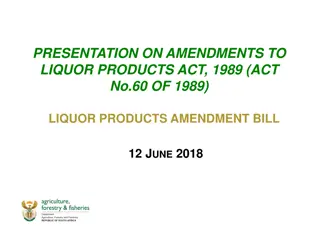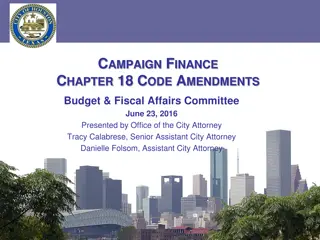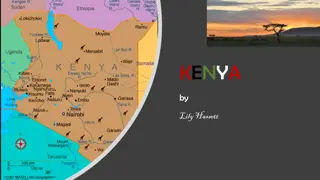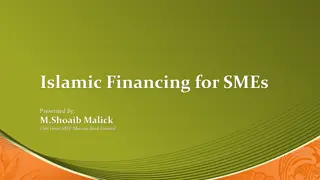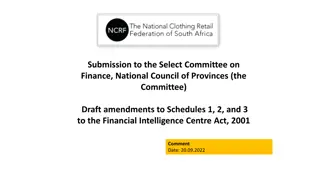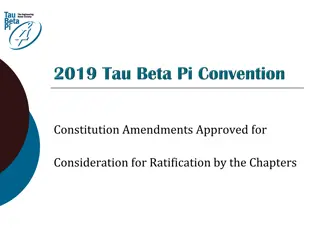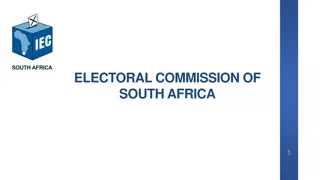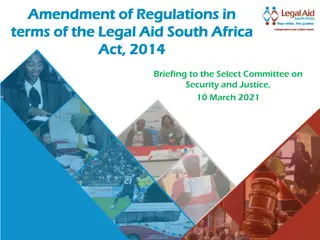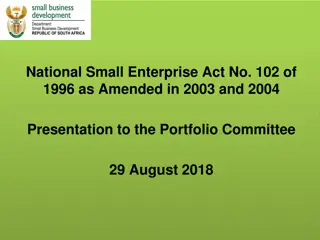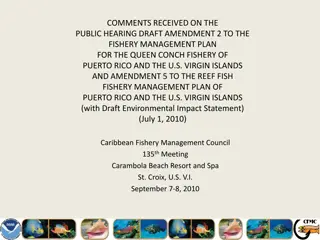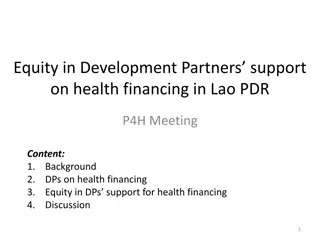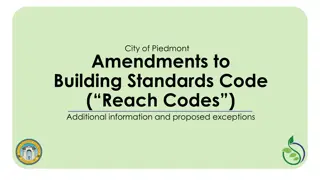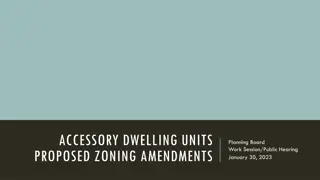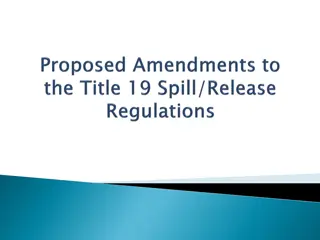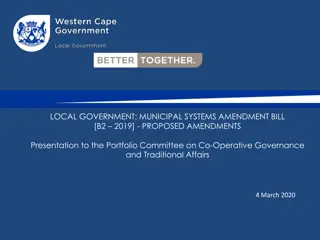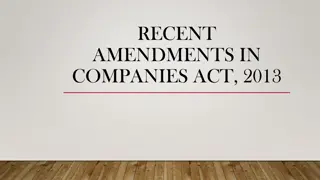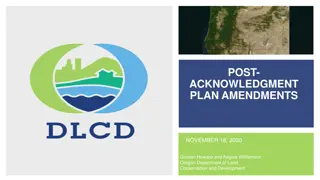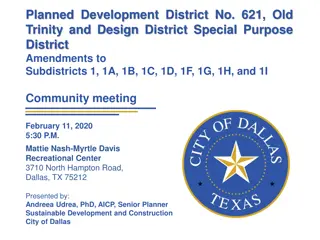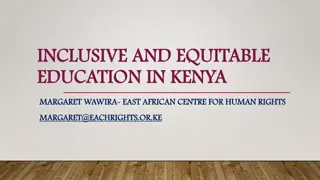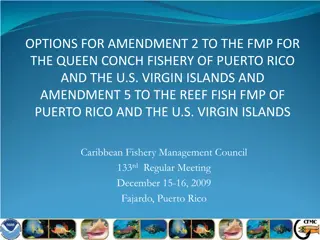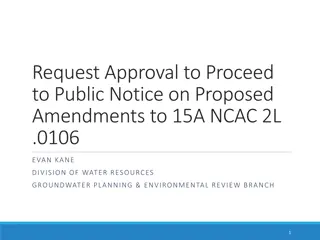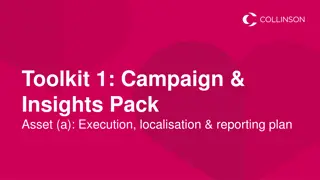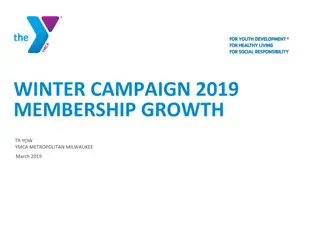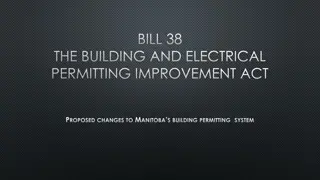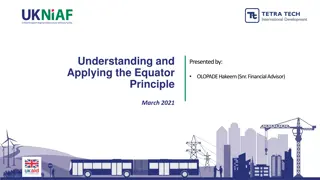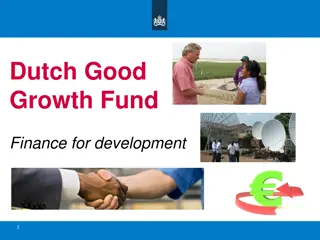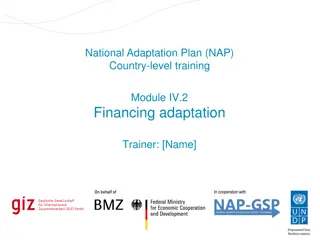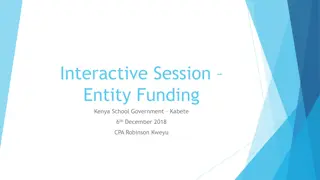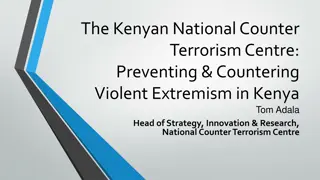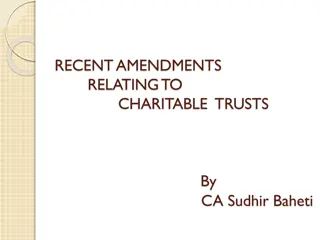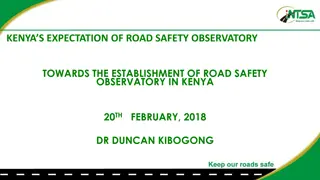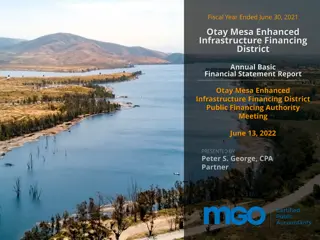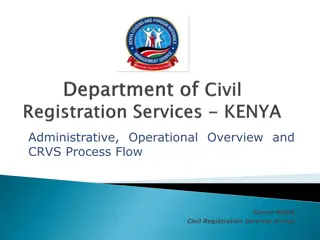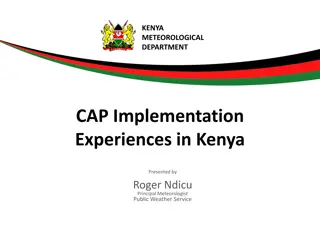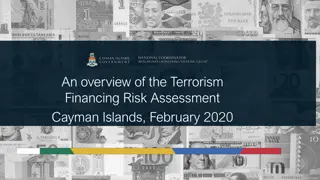Understanding Campaign Financing Act and Proposed Amendments in Kenya
The costs of campaigning for elective office in Kenya have escalated, driven by the need to win at all costs and the influx of dirty money. The Campaign Financing Act, 2013 aims to regulate campaign finances, ensure transparency, and limit the influence of money in politics. The Act seeks to create a level playing field for all aspirants and prevent corruption in campaign funding.
Download Presentation

Please find below an Image/Link to download the presentation.
The content on the website is provided AS IS for your information and personal use only. It may not be sold, licensed, or shared on other websites without obtaining consent from the author. Download presentation by click this link. If you encounter any issues during the download, it is possible that the publisher has removed the file from their server.
E N D
Presentation Transcript
Campaign Financing Act 2013 and Proposed Amendments September 2021
Introduction High stakes and costly campaigns Holding elective office in Kenya offers one a chance to serve the people who have elected them. To be elected, one must spend a lot of money in order to effectively compete and emerge victorious. Aspirants and candidates spend money in order to mobilise and win the support of the majority of voters in their electoral areas. Campaigning for elective office in Kenya is a high stakes contest which attracts numerous interests and creates intense competition. Campaigning has become increasingly expensive basically because the winner take all electoral system excludes losers. The desire to access elective office attracts numerous interests and creates intense competition. Increasing costs are driven by candidates who engage in high octane and flashy campaigns using various platforms and instruments including helicopters, bloggers to and other expensive media platforms. The desire to win at all costs has resulted in some of these interests pumping dirty money - proceeds of crime and corruption into campaigns.
Introduction (contd.) The costs of campaigns has increased by voters themselves who do not seem to understand that the role of a representative is that of oversight and policy making, not direct service provision. They increasingly demand handout from candidates in order to pledge their support. This behaviour raises costs of those who indulge in the practice and even those who do not. In other countries, supporters contribute resources to their candidates or they volunteer their services in lieu. In Kenya the culture of volunteerism is weak and candidates routinely pay for even the most elementary tasks performed by their own supporters. Aspirants interested in being nominated by particular parties compete through nominations and sometimes it is the aspirants with the highest bids who receive party nominations. In party strongholds, whoever gets party nomination is almost assured of being elected. Even as the costs of campaigning continue to escalate women generally start off with lack of resources, regardless of the source of funds. They frequently make do with more limited resources than their male counterparts. Women traditionally have a lower economic status than men. Consequently they lack the professional and business networks that generate the financial support needed for their campaigns.
Controlling money flows and overview of the CFA,2013 Money has often been cited as the root cause of bad governance. Creating legal provisions to limit the amount of money flowing or being pushed into the system is therefore seen as an obvious remedy. Ideally, campaign law should precipitate popular policy choices once elected and prevent policy capture. Ultimately, the law should prevent democracy from being narrowed down to the rule of the rich few who influence the distribution of resources, politics and public policy choices to their advantage. What is campaign financing? Campaign financing is viewed as resources spent by a candidate or a political party during an election period for purposes of campaign . It covers both direct and indirect costs and places spending limits (caps) on campaign spending by political parties and candidates and it requires that sources of the funds be revealed, accountability measures instituted with full disclosure and reporting mechanisms. The Campaign Financing Act, 2013 (CFA 13) was enacted in order to provide for the regulation, management, expenditure and accountability of election campaign monies and to restrict donations from certain sources. This would hopefully result in creating level playing field; thus giving all aspirants equal opportunity to compete, to prevent dirty money from influencing campaigns and to generally improve governance especially the oversight function at national and county levels.
Controlling money flows and overview of the CFA 2013 (contd.) The IEBC has since drafted amendments to the Act for purposes of 2022 elections and the specified funds will cover the expenditure six months to Election Day i.e. 9thFebruary, 2022 to 9th August 2022. The funds are to be spent in two phases: (a) to fund the operations of the party primaries; and (b) to fund the expenses between the party primaries and the date of the general election. The Act is clear on definitions of contributions, donations and illegal sources . Financing is to be solicited from three main sources i.e . Lawful sources, including individuals and political parties, Harambees, and voluntary contributions, lawful foreign sources whose contribution may not exceed 20% of total aspirant s or candidate s fund. Contributions from foreign governments and illegal sources are prohibited. The Act further makes provisions for monetary and non monetary contributions including loans and other assets. The caps were customised based on the elective office, number of votes and geographical features of the electoral area.
Expenditure Limits of CFA 2013 and current situation The CFA 2013, expenditure limits are custom-made for each of the counties, 290 constituencies and 1450 wards. They take into consideration the following factors: geographical features, including urban centres; the type of election; the population in an electoral area; the number of party members in an electoral area; and the communication infrastructure in an electoral area. The limits set by the commission range between KES.33 402 771.08 for Mandera South to KES. 141,037.00 for Nyando Constituency. The IEBC also set a limit on contributions for candidates in elections in County Assembly Wards. In respect of population and geographical area, the limit for the position of the County Assembly Ward ranges from between KES. 10 321 669.69 for Elwak South in Madera County to KES. 68 884.07 for Fafi County, Representative Ward in Garissa County. The caps that were written into the CFA 2013 anticipated huge expenditures. Those found guilty of breaching the rules will be liable to a fine not exceeding KES. 2 million or a term of imprisonment not exceeding five years or both. However, these have been reviewed in the Finance Campaigning (Amendment) Bill, 2020 which is meant replace the CFA 2013 Act which in any case was never implemented. The High Court suspended laws requiring parties and candidates to open transparent bank accounts and disclose finances. Consequently, this law was not applied in 2017 general elections .
Side Note The proposed caps in the 2020 Billfor positions of Governor, Senator, and Woman representative will be, different amounts for different counties. Those in Wajir have a limit of KES.104 million, Garissa KES. 89 million, Kitui KES.77 million, Kiambu KES. 71 million, Tana River KES. 68 million, Kajiado KES.66 million and Mandera KES. 65 million Those in Kilifi will spend no more than Sh62 million, Narok Sh61 million, Kakamega KES.59 million Meru KES. 56 million, Bungoma KES. 54 million, Machakos KES.53 million, Isiolo KES. 50 million, Samburu and Makueni each have a ceiling of KES.45 million. I am seeking clarity on these and other contents of the Amendment Bill. I am also seeking clarification on credible information that the media council has developed guidelines on promoting women participation. Please visit Media Council develops guidelines to promote women participation in 2022 elections for further details.
A note on spending limits spending limits (caps) The campaign Financing Act, 2020 is currently before parliament and has proposed different caps and parliament appears bent on changing them substantially or even throw the entire Bill out altogether. Actual expenditures in 2017 by women candidates Women usually have less access to financial resources as compared to men. Their focus is should therefore be on how to raise funds rather than worry about campaign limits. In 2017. the Westminster Foundation and NIMD conducted a research on campaign expenditure and found that In average, a Senatorial candidate spent KES.35.5 m, Woman Representative. KES.22.8m Member of National Assembly KES. 18.2m, Member of County Assembly KES.3.1m. It was also found the women who spent more money had better chances of winning. On average, the winning women Senators spent KES. 49m each against losers at KES. 20.3m,Women Representatives spent 32.2 m against losers at 13.4m MPs at 21.2m against KES.14.9 for losers and MCAs at 4.2m against individual losers at 2.3m each. The lesson here is simply that one needs significant war-chest to succeed. And for first time aspirants should learn from the realities of 2017 and expect to spend even more because the electorate will grow by 7million voters and will require even more resources.
Management of Funds and Accountability The proposed amendments to CFA 2013 retain a lot of what was in the original Act. Political parties and candidates contesting in the 2022 General Election are required to open campaign financing accounts, create financing expenditure committees and appoint authorised persons who will manage campaign funds, at least two months before elections: a) All political parties and candidates contesting in the 2022 Elections to establish Expenditure Committees comprising of persons nominated by the governing council of the political party or by the independent candidate as the case may be. b) All political parties, candidates to submit names of persons authorised to manage their accounts being either the candidate, candidate s agent, or member of the party Expenditure Committee. c) All authorised persons shall be required at registration to open campaign financing bank accounts where contributions by a candidate, political party, or contributions received from a lawful source will be received and submit the details of the accounts to the Commission. d) The Commission shall monitor and investigate all information relating to party nomination expenses and election campaign expenses of candidates and political parties. e) Expenditure reports shall be submitted to the Commission within 21 days of the political party nomination and within three months after elections.
Challenges in Implementing CFA 2013 or its Amendment 2020 It is apparent that there was little if any political will to abide to election finance regulations. Although there are laws, policies and guidelines governing the use of money during elections, there is little political will to implement them. Political parties and politicians are expected to report money collected and used in their campaigns, but no clear mechanisms have been put in place for media and public audit, and this renders it difficult to guarantee transparency and accountability. No clear measures have been proposed to disclose such sources for public scrutiny. While the Commission is required by the Act to make this information available on request, such a limited window is clouded by confidentiality requirements arising from a court ruling which blocked transparent exposure of bank accounts and disclosure. Despite the fact that the Act demands that candidates or political parties that spend within beyond certain limits and file a report with the Commission, there is scant if any evidence of this in the public domain
Challenges in Implementing CFA 2013 or its Amendment 2020 In most cases, measures to curb electoral financial fraud are not sufficiently punitive to act as a deterrent and they do not encourage compliance. Illicit money still finds its way back into the system as politicians exploit gaps within established laws. A thinker remarked that Money, like water, will continue to seep into the political system. Reforms can change the direction that the money makes, but money will eventually seep back into the system as political actors identify and exploit loopholes in the law . As far as private party donations are concerned, there is uncertainty about the amounts donated and there is generally little transparency in the financing process of the parties and their candidates The IEBC has capacity challenges and may not scrutinise finances of all the candidates, let alone hold them culpable in a court of law. In other countries scrutinising campaign financing is done by an independents agency outside the Electoral Management Body. The Political parties Fund goes to only two large political parties as the rest did not garner at least 5% of the total vote although they have substantial representation in the Senate National Assembly and County Assemblies . In computing eligibility for public funding, The law considers the presidential votes placing the parties which do not field at a candidates at that level at a disadvantage.
Random Dos and Donts by women candidates Make sure you fully understand the requirements of the CFA, its deadlines and sanctions for non compliance. Do not assume that violations will not be known because your opponents monitor your campaign and actually get all the critical information from moles in your campaign. Invest in voter registration. The voter is the ultimate campaign resource. Go to gathering and encourage people to register to vote. This will signal your intention to vie and it will create a lasting impression on the electorate. The voter registration stage is very crucial to an aspirant and substantial resources should be set aside for it. People are a resource within the meaning of the law so carefully select and appoint campaign agent expenditure committees. Agents shift loyalties and can let you down if you make wrong choices. Use money to maximum effect by critically tracking your expenditures and measuring them against your expectations. Position yourself strategically within your political party. Note that only 20% of women received any form of support from their parties.
Random Dos and donts (contd.) Always assume your opponents and others know about the source of your finances hence avoid receiving illicit finances. Never assume you can receive illegal money and keep it secret. Some of your agents and confidants are moles of your opponent while others play double games to be in good graces of the eventual winner. When receiving or withdrawing cash, ensure you have sufficient security. Criminals always assume candidates have a lot of money and they are likely to attack you if not well guarded. Do not sell family property or assets. Instead look for networks of collaboration, resource sharing and position yourself to garner support and terms of resources from like minded, existing or potentially supportive networks. Do not rely on promises of party funding. These are often broken. In fact only 20% of women aspirants/candidates access funding from this source. Never receive funds on the basis of promising directly or indirectly that you will influence appoints of donors or their cronies to public offices or to supply tenders and contracts. Sell yourself on a consistent message instead.


